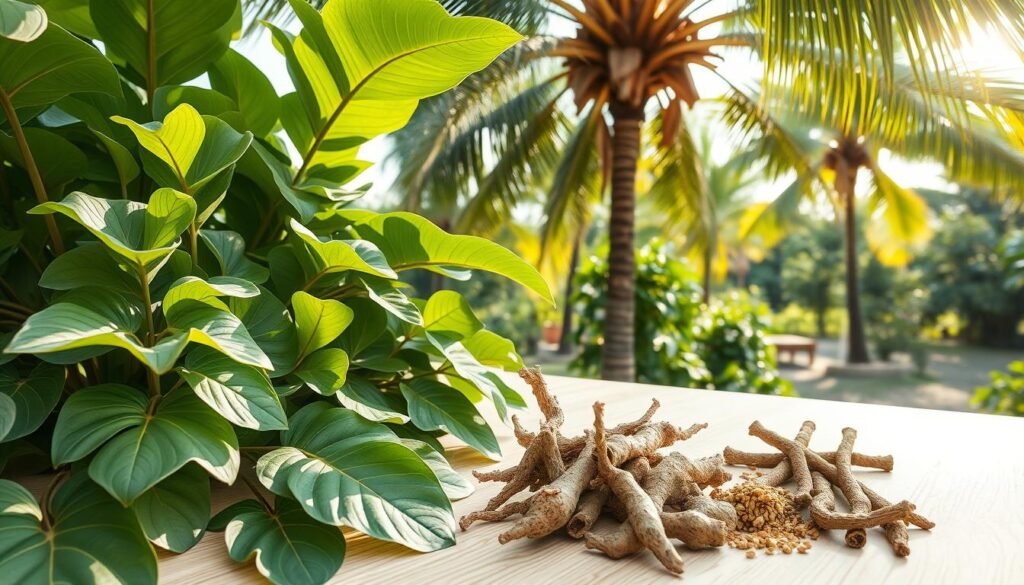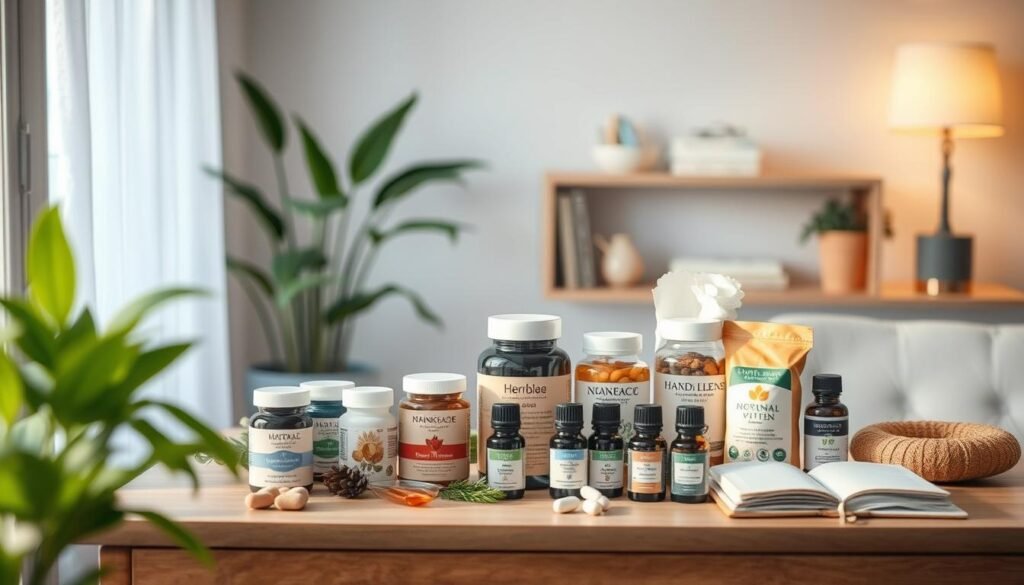About 40 million adults in the U.S. feel the effects of anxiety yearly. This significant number points out how much anxiety changes everyday life. It pushes people to find working solutions for peace. Today, more people look for over-the-counter (OTC) options to ease their anxiety symptoms. This guide talks about different OTC choices, from plants to key supplements. They are popular among those who want to manage their anxiety levels.
These remedies might help, but they can’t replace expert mental health care. It’s key to know how to mix the best OTC medications for anxiety into a full care plan. Doing this well can help control anxiety symptoms. This guide will help readers know their options. Plus, it stresses the need to talk to health experts before starting any supplements.
Key Takeaways
- Anxiety affects approximately 40 million adults in the U.S. each year.
- Natural, over-the-counter options are increasingly sought for anxiety relief.
- Professional mental health care remains the most effective treatment for anxiety disorders.
- OTC medications include herbal remedies, supplements, and stress-reducing products.
- Consulting with healthcare providers is crucial before trying new anxiety-relief methods.
Understanding Anxiety and Its Symptoms
Anxiety is more than just feeling stressed sometimes. It’s a collection of mental health issues that cause fear, worry, and unease. Symptoms range from too much worry and feeling jumpy to trouble focusing. People with anxiety might have tense muscles, a fast heartbeat, and trouble sleeping. These issues greatly impact daily life and happiness.
About 20% of adults worldwide will face an anxiety disorder at some point. This makes it a very common mental health issue. More women than men are diagnosed with anxiety disorders. It’s important to understand anxiety because many factors play a part in it. Things like genetics, the environment, and your mind all contribute. Studies show that brain chemicals like serotonin and GABA help manage anxiety. But how well they work can vary from person to person.
For those looking for help, recognizing anxiety symptoms is key to managing them. Over-the-counter (OTC) options include herbal products and dietary aids. These can help with mild to moderate anxiety and are easy to get. However, their effectiveness differs, so care is needed. It’s best to talk to a professional for advice, especially for ongoing anxiety symptoms. Many types of treatment can help, not just medicine.
If you want to know more about dealing with anxiety, this article offers great advice. It talks about different ways to help, like natural supplements, therapy, and changing your lifestyle. All these can help you better manage your anxiety.
Importance of Seeking Natural Relief for Anxiety
Anxiety affects millions in the United States. Many seek natural relief for anxiety through herbs and OTC options. These may be safer and less likely to lead to dependency than prescription drugs.
The benefits of natural remedies include their easy integration into daily routines. Chamomile and passionflower, for instance, could help those with anxiety. Chamomile has even been effective for generalized anxiety disorder. These remedies offer flexibility, helping people manage symptoms with healthier lifestyle choices.
Using herbal treatments can reduce anxiety and improve overall well-being. They’re gentle, improving mood and lowering stress with minimal side effects. They’re ideal for those seeking simple alternatives to conventional medicines.
With anxiety on the rise, safe, natural solutions are crucial. Those looking for natural relief for anxiety may find peace in nature’s remedies. The benefits of natural remedies go beyond symptom management, enhancing life’s quality.
| Natural Remedy | Potential Benefits | Notes |
|---|---|---|
| Chamomile | May reduce anxiety symptoms | Studied for generalized anxiety disorder |
| Passionflower | Helps treat anxiety and restlessness | Natural calming agent |
| Kava | Research suggests significant anxiety relief | May cause mild side effects |
| Lavender | Calming effects on mental well-being | Aromatherapy uses show promise |
| Ashwagandha | Reported to reduce stress levels | Effective at higher dosages |
Best OTC Medications for Anxiety
Finding effective OTC anxiety medications can give people more ways to handle anxiety. These do not require a doctor’s prescription. Many people turn to herbal supplements and vitamins, which are popular in holistic health.
Overview of Effective Non-Prescription Options
There are several herbal remedies and supplements known to help with anxiety. Here’s a breakdown of some top choices:
- Kava: Traditionally used for relaxation.
- Passionflower: Known for its potential calming effects.
- Valerian Root: Promoted as a sleep aid, though its effectiveness for anxiety remains inconclusive.
- Omega-3 Fatty Acids: Contributes to overall mental health by reducing inflammation and anxiety.
- Chamomile: A gentle herb that may help reduce mild anxiety effects.
Key Ingredients in OTC Anxiety Medications
It’s important to know the key ingredients in OTC anxiety medications. This knowledge helps people make better choices. Here are some ingredients known for their calming effects:
| Ingredient | Benefits |
|---|---|
| L-theanine | May promote relaxation without drowsiness. |
| Magnesium | Effective in reducing mild anxiety symptoms and crucial for mental health. |
| Omega-3 Fatty Acids | Helps reduce inflammation and anxiety levels. |
| Melatonin | Aids in regulating sleep patterns. |
Herbal Anxiety Treatments
Herbal remedies are becoming more popular for managing anxiety. Kava, passion flower, and valerian root are especially notable. They offer unique ways to relax and feel better mentally. Here’s more about these herbs, including Kava’s benefits and risks.
Kava: Benefits and Risks
Kava is known for helping people feel calm. Those who use it often say they feel less stressed. However, there are risks of Kava to consider. The FDA warns about possible liver issues from long-term use. Always talk to a doctor before trying Kava, especially if you’re pregnant or breastfeeding.
Passion Flower for Promoting Relaxation
Some studies suggest passion flower can help you relax and cut down on anxiety. It’s usually safe for a short period and can be a gentle aid for anxiety. To learn more about natural treatments, check out the advice at WebMD.
Valerian Root: A Sleep Aid with Potential
Valerian root might assist those with trouble sleeping due to anxiety. It’s important to be cautious with how long you use it. The risk of becoming dependent is something to think carefully about. For more on this and other herbal therapies, visit MoodCare Health.

| Herb | Benefits | Risks |
|---|---|---|
| Kava | Reduces anxiety, promotes relaxation | Potential liver toxicity |
| Passion Flower | Provides relaxation, few side effects | Limited long-term research |
| Valerian Root | May alleviate sleep disturbances | Risk of dependence on prolonged use |
Anti-Anxiety Supplements
Managing anxiety can take more than one approach. Anti-anxiety supplements provide a natural option alongside traditional treatments. They’re known for their L-theanine benefits and can help create a calmer mind.
L-theanine: The Calming Amino Acid
L-theanine is a calming amino acid mainly found in green tea. It’s known for promoting relaxation without making you sleepy. It also boosts cognitive abilities and emotional stability. If you’re looking to use L-theanine, its stress reduction capabilities are key. You can learn more about its benefits here.
Magnesium: Its Role in Mental Health
Magnesium is crucial for brain health and can lower anxiety symptoms. Adding magnesium to your diet may improve your mental health. Besides mood stabilization, it’s great for anxiety relief.
Omega-3 Fatty Acids: Nourishment for the Brain
Omega-3 fatty acids come from fish and supplements and are vital for brain health. Studies show they can lessen anxiety symptoms. Including omega-3s daily boosts mental wellness and resilience.
Melatonin: Regulating Sleep and Anxiety
Melatonin helps regulate sleep and aids in anxiety management, particularly for those who struggle with sleep. It enhances sleep quality, thus improving mental health. Its use makes relaxing easier, helping to tackle anxiety effectively.
Natural Remedies for Anxiety Relief
Many people suffer from anxiety and look for natural ways to find comfort. Herbs like chamomile, lavender, and lemon balm are becoming popular. They are known for their calming effects and might help those dealing with anxiety.
Chamomile: A Gentle Calming Agent
Chamomile is famous for its soothing properties, often consumed as tea. Research supports its role in reducing anxiety symptoms. For example, a study found that people with generalized anxiety disorder improved after taking chamomile extract daily.
However, those on blood-thinner medicines should be cautious.
Lavender: Aromatherapy Benefits
Lavender essential oil is known for its calming properties. Studies show it can lessen anxiety and help with sleep. It’s become popular in aromatherapy for relaxation. But, take care if you’re thinking about taking it by mouth, especially if you’re pregnant or a child, because the safety data is not enough.
Lemon Balm: Easing Worry and Stress
Lemon balm can help soothe anxiety and bring peace. Some people might experience a slight stomach upset, but it’s usually okay for most. Knowing the benefits of lemon balm can help those looking for natural stress relief.

| Herb | Primary Benefit | Considerations |
|---|---|---|
| Chamomile | Reduces anxiety symptoms effectively | Use caution with blood-thinning medications |
| Lavender | Calming agent for anxiety and sleep | Avoid oral use for children and pregnant women |
| Lemon Balm | Promotes relaxation and eases stress | May cause mild stomach discomfort |
Stress-Reducing OTC Products
Anxiety affects many parts of daily life. To ease its symptoms, people look for effective solutions. Products like essential oils, soothing teas, and meditation tools are popular. They help reduce stress in natural ways. Along with changes in lifestyle and therapy, these can offer good support.
Essential Oils: An Alternative Approach
Lavender and chamomile oils are famous for their relaxing effects. Aromatherapy uses these oils to help calm us down. You can spread their scent at home or rub them on your skin. This increases their soothing power. Trying out different blends may result in finding the best stress relief for you.
Calming Teas: Brewing Relaxation
Adding herbal teas to your day can be a great stress buster. Chamomile, lemon balm, and valerian teas are known for their calming effects. Drinking these regularly can create a peaceful atmosphere. They are perfect for a self-care routine.
Meditation Aids: Mindfulness Tools for Anxiety
Using meditation aids helps in fighting anxiety. There are many tools out there, like apps for guided meditation. These tools assist in relaxation and improving mental health. By focusing on mindfulness, one can keep their mind healthy. It opens up ways to reduce stress effectively.
Precautions and Considerations
When looking for ways to manage anxiety, be careful. It’s important to find treatment that fits you personally, as everyone’s health background and sensitivities are different. Getting advice from a healthcare expert is crucial. They help make sense of anxiety treatments and check that they’re okay with your health conditions.
Consulting Healthcare Professionals
It’s wise to talk to healthcare professionals before starting new treatments or taking over-the-counter meds. They can give you a safe plan that works. They’ll look for any hidden health issues. This ensures that anxiety treatments are right for you.
Understanding Potential Side Effects
Even supplements or herbs can have side effects like making you sleepy or upset your stomach. It’s good to know these potential side effects of medications. Pay attention to how your body reacts to new treatments. This keeps you safe while dealing with anxiety symptoms.
Interactions with Prescription Medications
Mixing over-the-counter remedies with prescription drugs could be risky because of how they might react together. Your healthcare provider can talk about these risks. They can suggest other options if needed. Knowing everything you’re taking helps avoid problems.

Setting Up a Personal Anxiety Relief Plan
Creating your own anxiety relief plan can greatly enhance your well-being. It should cover different areas of your life, mixing doable steps and emotional strategies. Lifestyle changes are vital for dealing with anxiety. These include regular workouts and learning how to deal with stress better. These steps lead to real, long-term improvements. Remember, medications help short-term, but personal strategies build a strong, healthy mindset.
Incorporating Lifestyle Changes
Making lifestyle changes is key to handling anxiety better. These changes aim to lower stress and boost mental health. Helpful habits to pick up are:
- Regular physical activity, which releases endorphins and reduces feelings of anxiety.
- Mindfulness meditation techniques that promote relaxation and emotional stability.
- Consistent sleep hygiene, ensuring adequate rest to cope with daily stressors.
- Healthy eating habits, fueling the body with nutritious foods that support brain health.
Combining Therapies for Best Results
Using different methods together works best for anxiety. Combining therapies can make each more effective. Think about these options:
- Try over-the-counter remedies and herbs like passionflower and chamomile for a well-rounded approach.
- Use Cognitive Behavioral Therapy (CBT) to change negative thinking.
- Use aromatherapy with lavender for a relaxing atmosphere.
- Look for clinics like Clarity Clinic for personalized treatment plans, including online therapy for convenience.
With a full plan that includes these tactics, people can see better progress in managing anxiety.
Conclusion
Exploring OTC meds, herbal treatments, and supplements shows us options beyond prescriptions for anxiety relief. Common drugs like SSRIs and benzodiazepines often bring unwanted side effects, including nausea and risk of addiction. This makes knowing the risks and looking at other options, like therapy and lifestyle changes, very important.
When it comes to easing anxiety, everyone’s path is different. Options like L-theanine, magnesium, and herbs such as chamomile and lavender may help, especially if your anxiety is not severe. It’s crucial to talk with a healthcare professional before trying new treatments. This ensures they’re safe and right for you.
Finding the right treatment for anxiety can lead to better mental health and a happier life. By understanding what’s out there, and how it affects you, you can make informed decisions. This helps people face anxiety with more confidence and hope.